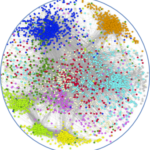Lien vers Pubmed [PMID] – 23449094
Bioinformatics 2013 May;29(9):1112-9
Aligning RNAs is useful to search for homologous genes, study evolutionary relationships, detect conserved regions and identify any patterns that may be of biological relevance. Poor levels of conservation among homologs, however, make it difficult to compare RNA sequences, even when considering closely evolutionary related sequences.


